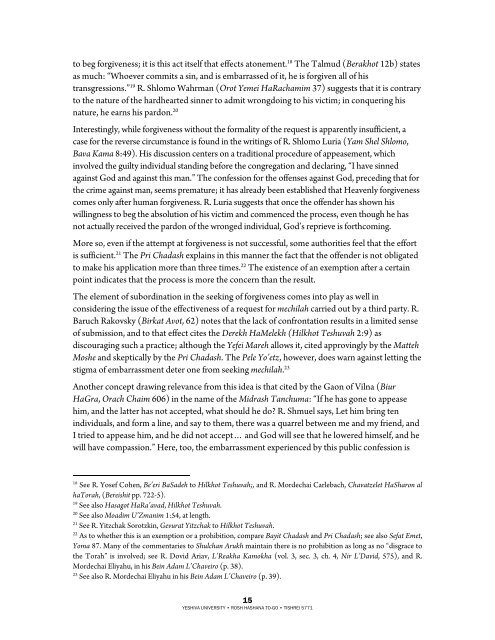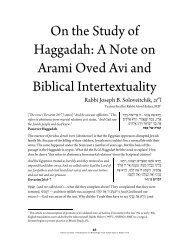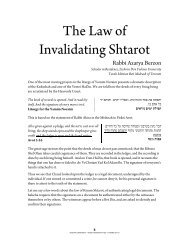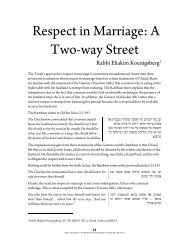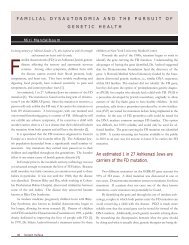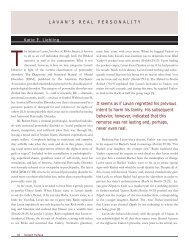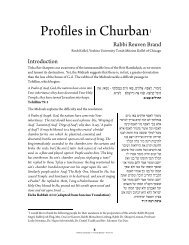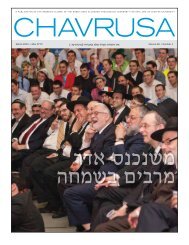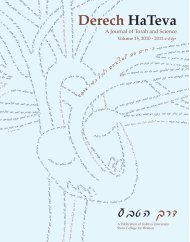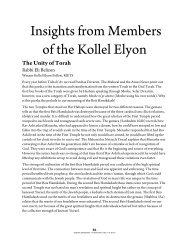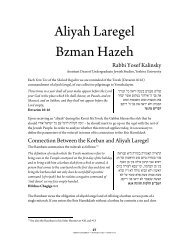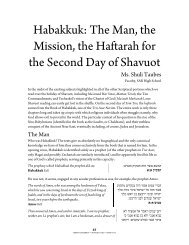YESHIVA UNIVERSITY • ROSH HASHANA TO-GO ... - YUTorah.org
YESHIVA UNIVERSITY • ROSH HASHANA TO-GO ... - YUTorah.org
YESHIVA UNIVERSITY • ROSH HASHANA TO-GO ... - YUTorah.org
Create successful ePaper yourself
Turn your PDF publications into a flip-book with our unique Google optimized e-Paper software.
to beg f<strong>org</strong>iveness; it is this act itself that effects atonement. 18 The Talmud (Berakhot 12b) states<br />
as much: “Whoever commits a sin, and is embarrassed of it, he is f<strong>org</strong>iven all of his<br />
transgressions.” 19 R. Shlomo Wahrman (Orot Yemei HaRachamim 37) suggests that it is contrary<br />
to the nature of the hardhearted sinner to admit wrongdoing to his victim; in conquering his<br />
nature, he earns his pardon. 20<br />
Interestingly, while f<strong>org</strong>iveness without the formality of the request is apparently insufficient, a<br />
case for the reverse circumstance is found in the writings of R. Shlomo Luria (Yam Shel Shlomo,<br />
Bava Kama 8:49). His discussion centers on a traditional procedure of appeasement, which<br />
involved the guilty individual standing before the congregation and declaring, “I have sinned<br />
against God and against this man.” The confession for the offenses against God, preceding that for<br />
the crime against man, seems premature; it has already been established that Heavenly f<strong>org</strong>iveness<br />
comes only after human f<strong>org</strong>iveness. R. Luria suggests that once the offender has shown his<br />
willingness to beg the absolution of his victim and commenced the process, even though he has<br />
not actually received the pardon of the wronged individual, God’s reprieve is forthcoming.<br />
More so, even if the attempt at f<strong>org</strong>iveness is not successful, some authorities feel that the effort<br />
is sufficient. 21 The Pri Chadash explains in this manner the fact that the offender is not obligated<br />
to make his application more than three times. 22 The existence of an exemption after a certain<br />
point indicates that the process is more the concern than the result.<br />
The element of subordination in the seeking of f<strong>org</strong>iveness comes into play as well in<br />
considering the issue of the effectiveness of a request for mechilah carried out by a third party. R.<br />
Baruch Rakovsky (Birkat Avot, 62) notes that the lack of confrontation results in a limited sense<br />
of submission, and to that effect cites the Derekh HaMelekh (Hilkhot Teshuvah 2:9) as<br />
discouraging such a practice; although the Yefei Mareh allows it, cited approvingly by the Matteh<br />
Moshe and skeptically by the Pri Chadash. The Pele Yo’etz, however, does warn against letting the<br />
stigma of embarrassment deter one from seeking mechilah. 23<br />
Another concept drawing relevance from this idea is that cited by the Gaon of Vilna (Biur<br />
HaGra, Orach Chaim 606) in the name of the Midrash Tanchuma: “If he has gone to appease<br />
him, and the latter has not accepted, what should he do? R. Shmuel says, Let him bring ten<br />
individuals, and form a line, and say to them, there was a quarrel between me and my friend, and<br />
I tried to appease him, and he did not accept… and God will see that he lowered himself, and he<br />
will have compassion.” Here, too, the embarrassment experienced by this public confession is<br />
18 See R. Yosef Cohen, Be’eri BaSadeh to Hilkhot Teshuvah;, and R. Mordechai Carlebach, Chavatzelet HaSharon al<br />
haTorah, (Bereishit pp. 722-5).<br />
19 See also Hasagot HaRa’avad, Hilkhot Teshuvah.<br />
20 See also Moadim U’Zmanim 1:54, at length.<br />
21 See R. Yitzchak Sorotzkin, Gevurat Yitzchak to Hilkhot Teshuvah.<br />
22 As to whether this is an exemption or a prohibition, compare Bayit Chadash and Pri Chadash; see also Sefat Emet,<br />
Yoma 87. Many of the commentaries to Shulchan Arukh maintain there is no prohibition as long as no “disgrace to<br />
the Torah” is involved; see R. Dovid Ariav, L’Reakha Kamokha (vol. 3, sec. 3, ch. 4, Nir L’David, 575), and R.<br />
Mordechai Eliyahu, in his Bein Adam L’Chaveiro (p. 38).<br />
23 See also R. Mordechai Eliyahu in his Bein Adam L’Chaveiro (p. 39).<br />
15<br />
<strong>YESHIVA</strong> <strong>UNIVERSITY</strong> <strong>•</strong> <strong>ROSH</strong> <strong>HASHANA</strong> <strong>TO</strong>-<strong>GO</strong> <strong>•</strong> TISHREI 5771


